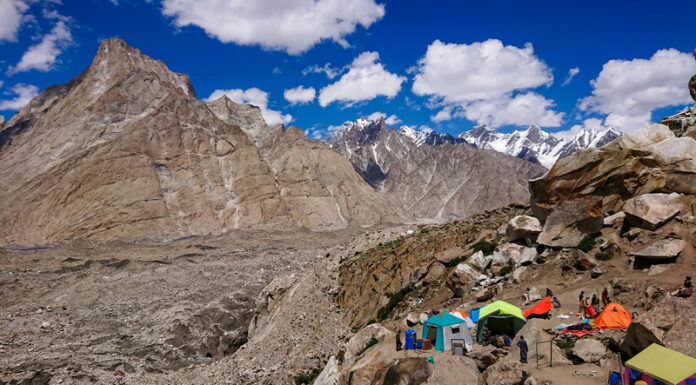German biathlon champion Laura Dahlmeier died July 28 following a mountaineering accident on Laila Peak in Pakistan’s Karakoram mountain range. The 31-year-old two-time Olympic gold medalist was struck by falling rocks at approximately 18,700 feet while climbing with her partner Marina Eva on Monday around noon local time.
Eva immediately issued a distress call after witnessing the rockfall incident, launching a massive rescue operation. However, the remote location, low visibility, and dangerous weather conditions severely hampered rescue efforts. Eva, who remained uninjured, was able to descend to base camp with assistance from rescuers on Tuesday.
Rescue teams confirmed Dahlmeier’s death on Wednesday but were unable to retrieve her body due to unfavorable weather conditions. Faizullah Faraq, a spokesman for the regional Gilgit-Baltistan government, indicated that any final decision on body recovery would follow the family’s wishes. Dahlmeier’s management team determined that she likely died instantly from the severity of her injuries based on helicopter flyover findings and Eva’s account.
Recovery efforts were subsequently abandoned after consultation with the Alpine Club of Pakistan. Several colleagues confirmed Dahlmeier had previously expressed that she did not want her body recovered if it would endanger rescuers’ lives. German mountaineer Thomas Huber, who participated in the rescue attempt, told reporters they decided she should remain where she fell because that was her wish. American rescue team member Jackson Marvell noted that while body recovery would be possible, it involved incredible risks both on foot and by helicopter.
Eva described the incident at a Thursday press conference in Skardu, explaining she saw Dahlmeier being struck by a large rock and thrown against the mountain wall. Eva said, “from that moment on, she didn’t move again.” Eva attempted to reach her partner for several hours but was unable to do so safely due to continued rockfall and difficult terrain.
Dahlmeier made Olympic history at the 2018 PyeongChang Winter Games, becoming the first female biathlete to win both sprint and pursuit gold medals at the same Olympics. She captured gold in the 7.5-kilometer sprint and 10-kilometer pursuit events, along with a bronze medal in the 15-kilometer individual competition. Throughout her career, she earned seven world championship gold medals, three silver, and five bronze medals, plus 20 World Cup race victories and the overall World Cup title in the 2016-17 season.
The German athlete began her professional career during the 2012-13 IBU World Cup season at age 19. She represented Germany at the 2014 Sochi Olympics, finishing 13th in the individual event, before achieving her breakthrough success four years later in South Korea.
Dahlmeier surprised the sports world by retiring from competitive biathlon in May 2019 at just 25 years old, citing diminished passion for professional competition. After retirement, she transitioned to mountaineering and became a state-certified mountain and ski guide in 2023. She also volunteered with the Garmisch-Partenkirchen mountain rescue team and worked as a biathlon commentator for German broadcaster ZDF.
German President Frank-Walter Steinmeier offered condolences to Dahlmeier’s parents, recalling how he presented her with Germany’s highest sporting honor, the Silver Laurel Leaf, after her first Olympic gold medal in 2018. He described her as an exceptional sportswoman and ambassador for Germany who exemplified peaceful and fair international cooperation.
The International Olympic Committee President Kirsty Coventry honored Dahlmeier’s historic achievements and lasting impact on the sport. The International Biathlon Union emphasized that her energy and passion touched people worldwide, noting her legacy would continue inspiring future athletes and adventurers.
Born and raised in Garmisch-Partenkirchen in the German Alps, Dahlmeier had been mountaineering in northern Pakistan since late June. She had successfully ascended the Great Trango Tower before attempting Laila Peak. The region experiences frequent climbing accidents due to avalanches, sudden weather changes, and above-normal seasonal rains that trigger flash floods and landslides.
Hundreds of climbers attempt to scale mountains in northern Pakistan annually, with accidents occurring regularly due to challenging conditions. The area has been particularly affected by harsh weather patterns, with at least 20 Pakistani tourists reported missing in recent flooding near the northern district of Chilas. Since late June, rain-related incidents have killed 288 people across Pakistan during the current monsoon season.








